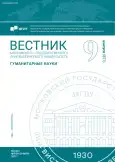Inaccurate Translation of Idiomatic Expressions from English into Russian as a Reflection of Mental Lexicon
- Autores: Krasotskaya M.D.1
-
Afiliações:
- People’s Friendship University of Russia
- Edição: Nº 9(877) (2023)
- Páginas: 123-129
- Seção: Linguistics
- URL: https://journal-vniispk.ru/2542-2197/article/view/334830
- ID: 334830
Citar
Texto integral
Resumo
This article investigates the issue of incorrect translation of some idiomatic expressions in bilingual (English-Russian) dictionaries and the reason this phenomenon occurs. In order to conduct the research comparative analysis, generalisation of dictionary definitions, and hypothesis advancement were applied. The research material consisted of idiomatic dictionaries. As a result of this investigation, a proposal was submitted that in most cases the incorrect translation depended on the coinciding key words in the Russian and English idioms. Due to this fact, the analogues were matched inadequately.
Palavras-chave
Sobre autores
Milana Krasotskaya
People’s Friendship University of Russia
Autor responsável pela correspondência
Email: Milana19971@yandex.ru
Postgraduate student of the Institute of Foreign Languages, People’s Friendship University of Russia
RússiaBibliografia
- Conkin, K., Schmitt, N. (2012). The processing of formulaic language. Annual Review of Applied Linguistics, 32, 45–61.
- Gordenko, N. V., Tishchenko, Yu. V. (2008). Slozhnosti perevoda angliyskikh frazeologismov na russkiy yazyk = Difficulties of translating English phraseologisms into Russian. Advances in current natural sciences, 3, 77–78. (In Russ.)
- Yemelyanova, Ya. B. (2019). The specific character of code-switching in translation. Vestnik of Saint Petersburg University. Language and Literature, 2(16), 214–228. (In Russ.)
- Minyar-Beloruchev, R. K. (1986). Informatsionno-kommunikativniye aspekty perevoda = Informationcommunicative aspects of translation (pp. 56–61). Gorky: GGPI imeni Gor’kogo. (In Russ.)
- Porshneva, E. R. (2002). Bazovaya lingvisticheskaya podgotovka perevodchika = Translator’s basic linguistic training. Nizny Novgorod: N. I. Lobachevsky Nizny Novgorod State University. (In Russ.)
- Sdobnikov, V. V. (2010). Protsess perevoda kak object psikholingvisticheskogo issledovaniya = Translation process as the object of a psycholinguistic research. Herald of Vyatka State University, 2(2), 107–111. (In Russ.)
- Khvesko, T.V., Nage, O. V., Basuyeva, N. Yu. (2021). Phraseological units as cultural code manifestation. Language and Culture, 54, 81–93. (In Russ.)
- Komissarov, V. N. (2011). Sovremennoye perevodovedenye = Modern translation theory. Moscow: R.Valent. (In Russ.)
- Zalevskaya, A. A. (1990). Slovo v leksikone cheloveka. Psikholingvisticheskoe issledovanie = A word in a person’s lexicon. A Psycholinguistic Study. Voronezh: Voronezh State University. (In Russ.)
- Emmorey, K. D., Fromkin, V. A. (1988). The mental lexicon. Linguistics: The Cambridge Survey (pp. 124–149). Cambridge: Cambridge University Press.
- Sekerina, I. (2016). Psikholingvistica (Morfologicheskaya organizatsiya i mentalny leksikon) = Psycholinguistics (Morphologic organisation and mental lexicon). Fundamental’nye napravleniya sovremennoj amerikanskoj lingvistiki. Sbornik obzorov. Moscow: URSS. (In Russ.)
- Zolotova, N. O. (2005). Yadro mentalnogo leksikona cheloveka kak estestvenny metayazyk = The mental lexicon core as a natural metalanguage: Senior Doctoral Thesis in Philology. Tver. (In Russ.)
Arquivos suplementares










